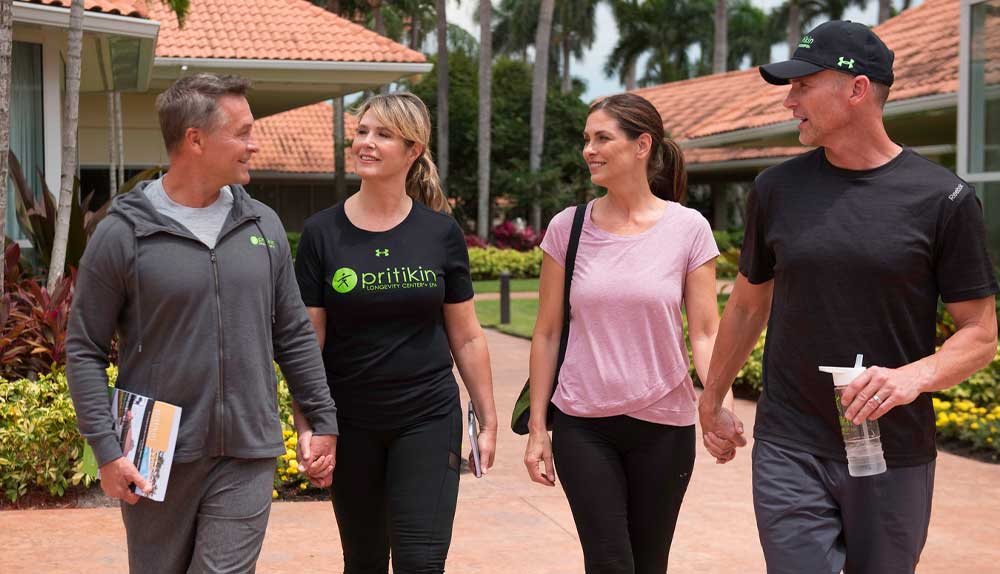How to Make Friends with Health Benefits
For health and longevity, good food and fitness matter in a very big way, but unbeknownst to Pritikin guests, the friendships they develop at the health resort may also play a profound role.

The banter begins with typical guy talk. The NFL. Golf. And often, the acknowledgment: “Hey, this rabbit food tastes pretty good…Who knew?” they joke.
For health and longevity, good food and fitness matter in a very big way, but unbeknown to Pritikin guests, the friendships they develop at the health resort may also play a profound role.
But then, the conversation slides easily, effortlessly, to deeper things. Cholesterol levels. Triumphs over diabetes. Dreams for the future. In the dining room and elsewhere at Pritikin, bonds form. Friendships grow. And they often last far beyond the week or two spent together at Pritikin.
Food, Fitness, Friendship
For health and longevity, good food and fitness matter in a very big way, but unbeknown to Pritikin guests, the friendships they develop at the health resort may also play a profound role.
Many studies over the past few years have found that people generally live longer, happier, and healthier lives if they have a strong circle of friends.
For example, a study from Sweden followed more than 1,800 people age 75 and older for nearly two decades and found that those who had a “low-risk profile” (healthy eating and exercising habits plus quality relationships) lived longer than those without this profile. On average, men lived a full six years longer; women, five.1
The Friendship Edge
In another large study, the Australian Longitudinal Study of Aging, researchers tracked nearly 1,500 older men and women for 10 years and found that those who enjoyed a strong network of good friends were significantly more likely to live longer than those with weak bonds.2
Heart Health
Good friendships seem especially helpful for the heart. In a two-year study of 500 women with heart disease, those with solid social connections were not only more likely to be alive after two years, but their rates of Type 2 diabetes and high blood pressure were lower, and they were less likely to have belly fat.3
And in a six-year study of more than 700 middle-age men, having close friendships was even more important than attachment to a significant other in reducing the risk of both heart attacks and deaths from coronary artery disease.4

Friends With Benefits
Why are friendships linked with heart health? Scientists are not sure, but point to a variety of possibilities. For starters, having strong social support can help relieve stress, a well-evidenced risk for heart disease.
When we’re surrounded by friends, stress hormones and blood pressure fall. From an evolutionary point of view, it certainly makes sense. We are social creatures. We evolved over centuries in group systems. We survived because of each other. So when we have supportive social connections, we feel more in control, more relaxed.
Science agrees. In a study conducted a few years ago, for example, researchers found that healthy men and women who were asked to describe major setbacks in their lives actually had lower blood pressure readings and pulse rates when a close friend was sitting by their side.5
Another reason why good friends are so important is because they often encourage us to be good, to take better care of ourselves. We’re more likely to eat healthy foods if we have a healthy network of friends and family, studies have found.
The research gives the phrase ‘friends with benefits’ a whole new meaning.
Think you need to have legions of friends for health benefits? Five hundred buddies on Facebook? Not at all. Overall, the quality of your relationships is far more important than quantity. After all, what good are 500 online friends if very, very few of them are people you’d truly consider close? People you’d feel comfortable revealing all your thoughts and feelings to? That’s what good friendship is all about.
Friends of a Certain Age
Of course, many of us in our 40s, 50s, and older think of making friends as something we did, well, long ago – in dorm rooms at college, or on first jobs. Yes, the days when we had time (and energy) for cultivating friendships. Days when conversation stretched easily, enjoyably, into the wee hours and beyond. It’s difficult to do that now, as New York Times writer Alex Williams recently described in his insightful piece, “Why Is It Hard To Make Friends Over 30?” Life has gotten in the way – huge responsibilities at work, and, often, even bigger ones at home.6

Life frees up at Pritikin’s health resort, “and friendships grow,” observes Dr. Fruge. “In fact,” she smiles, “our guests often tell us, ‘I feel like I’m back in college.’ And we understand why. They’re getting a great education – this time it’s in health and longevity. They’re feeling young again, thanks to the very healthy food and fitness program here. They’re meeting many interesting and like-minded individuals. And there’s time to enjoy – and develop – these new connections.”
“There something about Pritikin. We have a lot of very successful people here, but the minute they walk in the door, all those accolades seem to get dropped off at the Front Desk. What becomes vital is what truly is vital – their health and well-being, and their personal drive to become the healthiest they can be.
“What’s fun to watch, too, is how our guests cheer each other on. They’re all in this big new thing called ‘healthy living’ together. They’re laughing and sharing all their missteps and triumphs. It’s no wonder that friendships – really good friendships – take seed.”
Especially among men. “We women already know how to make friends,” laughs Dr. Fruge. “Men often need a little boost, something that nudges them beyond the usual talk of baseball and business.
“That ‘something’ happens at this health resort. And the benefits, more and more research is finding, are life-saving.”